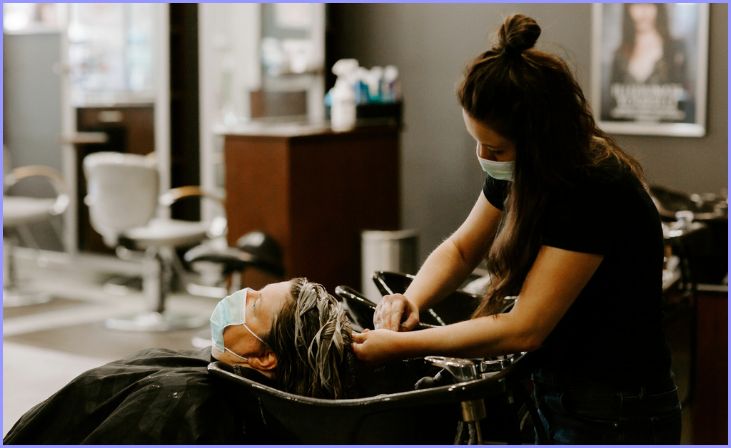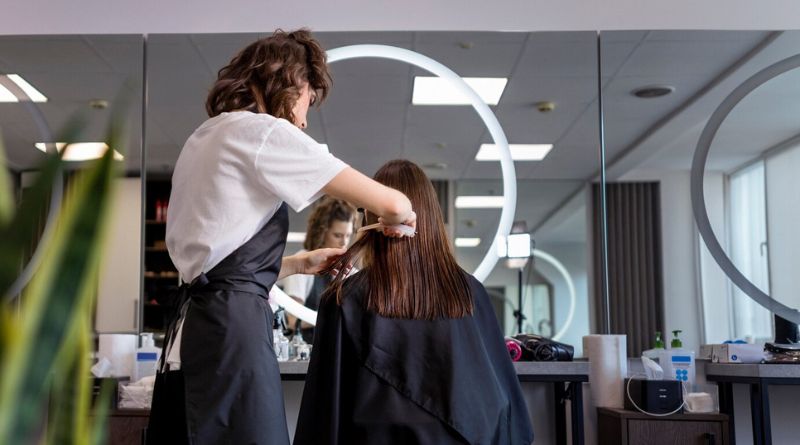Are you considering a career in the glamorous world of hairstyling but find yourself pondering the financial aspect? Understanding the average hair stylist salary is a crucial step towards making an informed decision. In this comprehensive guide, we delve into the intricacies of hairstylist earnings, exploring the factors that influence this vital aspect of the industry.
Average Hair Stylist Salary

The average salary for a hair stylist can vary depending on various factors, including location, level of experience, and the type of salon or establishment. In the United States, the national average salary for a hair stylist typically ranges from $30,000 to $40,000 annually.
However, it’s important to note that specialized skills, such as proficiency in specific hair treatments, advanced styling techniques, or niche services like bridal styling or color correction, can significantly impact a hair stylist’s earning potential. By acquiring diverse skills and staying abreast of the latest industry trends, hair stylists can position themselves for higher earning opportunities within this competitive and dynamic field.
Factors Influencing the Average Hair Stylist Salary

Several key factors contribute to the fluctuations in the average hair stylist salary. Understanding these influences is crucial for both aspiring and seasoned professionals in the hairstyling industry. Below are the main factors that play a significant role in shaping the earnings of a hair stylist:
Geographical Location
The location of a salon or a stylist’s workplace is one of the primary determinants of their salary. Metropolitan areas and urban centers tend to offer higher salaries compared to rural or less populated regions. This discrepancy often stems from the variance in living costs and the overall demand for premium hair services in densely populated areas. Furthermore, areas with a high cost of living may necessitate higher service charges, ultimately contributing to increased earning potential for hairstylists.
Level of Experience
Experience is a crucial factor that directly impacts a hair stylist’s salary. Entry-level or junior stylists typically earn less compared to those with several years of experience. Seasoned professionals often command higher salaries due to their refined skill sets, established client base, and proven track record of delivering quality services. Additionally, experienced stylists are more likely to have developed specialized expertise, allowing them to offer premium services that can attract higher-paying clientele.
Also Read: How much does it cost to get a haircut at Great Clips?
Type of Salon or Establishment
The type of salon or establishment where a hair stylist is employed can significantly affect their earning potential. High-end salons, luxury spas, or upscale beauty establishments often offer higher salaries and better commission structures compared to local, budget-friendly salons. These premium establishments typically attract a clientele willing to pay more for exclusive services, allowing stylists to earn more through service charges and gratuities.
Additional Certifications or Training
Hair stylists who invest in additional certifications, training, or workshops to enhance their skills and knowledge often have an advantage in terms of salary negotiation. Advanced certifications in specialized treatments, such as keratin treatments, hair extensions, or advanced color techniques, can position a stylist as an expert in their field. This expertise not only justifies higher service charges but also enables stylists to cater to a more diverse and affluent clientele, leading to increased earning potential.
By understanding and navigating these influential factors, hair stylists can make informed decisions to advance their careers and maximize their earning potential within the dynamic and competitive hairstyling industry.
Analyzing the National Average Hair Stylist Salary Trends
Certainly, here is a tabular representation analyzing the national average hair stylist salary trends in the United States over the past few years:
| Year | National Average Salary (USD) | Average Salary Growth (%) |
|---|---|---|
| 2020 | $30,000 – $40,000 | – |
| 2021 | $31,000 – $42,000 | 3.3% |
| 2022 | $32,000 – $44,000 | 3.2% |
| 2023 | $33,000 – $46,000 | 3.1% |
The table highlights the national average salary range for hair stylists in the United States from 2020 to 2023, showcasing a steady increase in earnings over the years. The growth percentage represents the year-on-year increase in the average salary, indicating a positive trend in the hairstyling industry. This data suggests that the demand for skilled hairstylists continues to rise, contributing to the upward trajectory of the average salary range. It’s important to note that these figures serve as general estimates and the actual salaries may vary based on specific geographical locations, levels of experience, and the type of salon or establishment.
Role of Specialized Skills in Enhancing Earning Potential

Specialized skills play a pivotal role in enhancing the earning potential of a hair stylist within the competitive beauty industry. By acquiring expertise in specific areas, stylists can position themselves as sought-after professionals, thereby commanding higher salaries and attracting a more discerning clientele. Some key ways in which specialized skills can contribute to increased earning potential include:
Advanced Styling Techniques
Hair stylists proficient in advanced styling techniques, such as precision cutting, intricate updos, and creative hair designs, often have an edge over their peers. Their ability to execute complex and innovative styles not only attracts clients seeking unique and high-quality services but also justifies premium service charges, leading to higher earnings.
Specialized Hair Treatments
Proficiency in specialized hair treatments, including keratin treatments, hair extensions, or scalp treatments, can significantly augment a stylist’s earning potential. These specialized services cater to clients with specific hair concerns, allowing stylists to offer personalized solutions and charge premium prices for their expertise and dedicated services.
Also Read: Cosmetologist Salary
Niche Services
Offering niche services like bridal styling, color correction, or hair coloring techniques tailored to specific trends or preferences can set a stylist apart from competitors. By catering to a specialized market segment, stylists can establish themselves as experts in their niche, thereby attracting clients willing to pay higher prices for exclusive and customized services, ultimately leading to increased earnings.
Client Retention and Referrals
Possessing specialized skills often translates into satisfied and loyal clients who are more likely to return for future services. Additionally, happy clients are inclined to refer their friends and family, thereby expanding the stylist’s customer base and fostering a steady stream of income through repeat business and referrals.
By continuously honing their craft and staying abreast of the latest industry trends and techniques, hair stylists can leverage their specialized skills to not only elevate their earning potential but also establish a reputable and thriving career within the dynamic landscape of the hairstyling industry.
Career Growth Opportunities in the Hairstyling Industry

The hairstyling industry offers a diverse range of career growth opportunities for passionate and skilled professionals. Beyond the role of a hair stylist, individuals can explore various avenues to advance their careers and expand their expertise within the field. Some prominent career growth opportunities in the hairstyling industry include:
Salon Management
Experienced hairstylists can transition into roles such as salon managers or supervisors, overseeing day-to-day operations, managing staff, and ensuring smooth functioning of the salon. This role allows individuals to utilize their industry knowledge and leadership skills to create a positive and productive salon environment.
Entrepreneurship
Aspiring entrepreneurs can establish their own salons or beauty establishments, providing them with the autonomy to set their own service standards, pricing structures, and business strategies. Owning a salon not only presents a significant earning potential but also allows individuals to build their brand and create a unique space within the beauty industry.
Education and Training
Seasoned hairstylists can venture into the field of education and training by becoming instructors at beauty schools or institutes. Sharing their expertise and industry insights with aspiring stylists not only contributes to the growth of the next generation of professionals but also provides a stable career path with opportunities for personal and professional development.
Brand Ambassadorship
Partnering with renowned beauty brands as a brand ambassador or influencer enables hairstylists to represent and endorse products and services, thereby enhancing their visibility and credibility within the industry. This role often involves collaborations, promotional campaigns, and educational initiatives, offering hairstylists a platform to showcase their skills and expertise on a larger scale.
Freelancing and Consultancy
Freelancing as a hairstylist for special events, fashion shows, or photo shoots allows professionals to showcase their creativity and work with diverse clients and projects. Additionally, offering consultancy services for beauty businesses or startups enables hairstylists to share their industry knowledge and provide valuable insights for the development and success of various beauty ventures.
By exploring these diverse career growth opportunities, hairstylists can chart a fulfilling and prosperous career path, leveraging their skills, experience, and passion for the art of hairstyling within the ever-evolving beauty and fashion landscape.
Also Read: How much does sally beauty pay?
Conclusion
Navigating the realm of hairstyling entails more than just a passion for fashion and beauty; it demands a keen understanding of the financial landscape. By recognizing the variables that contribute to the average hair stylist salary, you can better equip yourself for a successful and fulfilling career in this dynamic and ever-evolving field. Embrace the potential of your craft, armed with the knowledge needed to thrive in the world of hair styling.
FAQs
Yes, specialized skills, such as expertise in specific hair treatments, advanced styling techniques, or niche services like bridal styling or color correction, can significantly impact a hair stylist’s salary. Possessing a diverse skill set and staying updated with the latest trends can often lead to higher earning potential in this competitive industry.
Hair stylists can negotiate a higher salary or better compensation package by showcasing their expertise, highlighting their contributions to the salon’s growth, and demonstrating their ability to attract and retain clients. Additionally, presenting a strong portfolio of their work, including before-and-after transformations and positive client testimonials, can strengthen their case for a higher salary.







